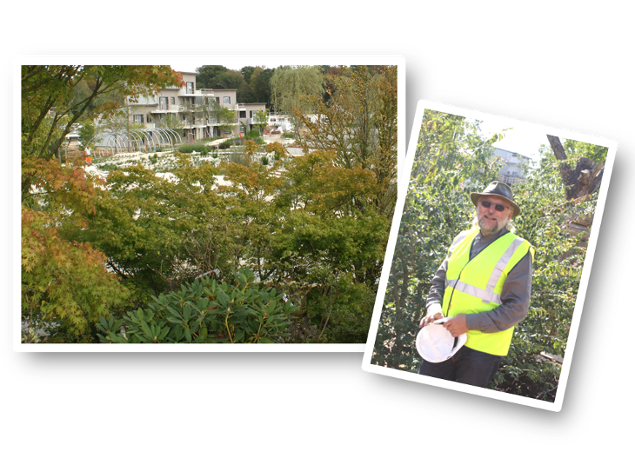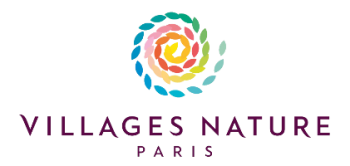Welcome in what tomorrow’s eco-city might look like

On 21 September 2016, Fondation Ensemble invited the members of its Board of Experts to accompany Thierry Huau, landscape architect, urban planner and ethnobotanist, on a visit to Villages Nature, a ground-breaking ecotourism site in the Paris region. This development, located on a large geothermal aquifer, is classified as being of ‘public interest’. The site visit began with a presentation by Mr. Gérard Brémond, the Foundation’s Chair. Run in partnership with One Planet Living*, Villages Nature aims to show how tourist development can be harmoniously reconciled with respect for the environment, human well-being and biodiversity conservation. Let’s follow our guide …
“We’re standing on land that belonged to one of the oldest fortified villages in France: Villeneuve le Comte (13th century),” declared Thierry Huau. “The nearby woods, which originate from land clearance by the monks, have been carefully preserved. And all the wood cut for the purposes of the project has been kept on site; throughout the visit, you’ll be able to see the various uses to which it has been put (decoration, bird nesting boxes, soil enrichment, etc.). Another key component is water, which we have chosen to make more visible. The water that quietly flowed here in the past will now be the main theme. During our visit, we’ll be following the entire water cycle. Everything here has been designed for living as close as possible to natural energy and connecting with the living world. Forest games, animal breeding, farm crops, vegetable garden, stables, fruit picking, school field trips – all this will inspire stories, experiences and encounters and arouse curiosity and wonder. In a few months’ time, the vegetation will have taken root and created terraces, hanging gardens and green walls, evoking the intertwining of the man-made and the natural.”
Walking through the Extraordinary Gardens, the visitors gradually discover the areas that will be devoted to the four elements (air, water, fire and earth) and can begin to picture the 250 000 trees and plants soon to be planted, the vast majority of which will be local species provided by nearby suppliers. Special attention has been paid to biodiversity: the botanical garden will contain hundreds of plant species from all over the world, supplied by European nurseries. Some areas will remain wild while others, in contrast, will be highly developed, such as the herb gardens or the earth garden, which will include a very large vegetable garden. “Everything has been planned to go ‘from the earth to the plate’”, explained Thierry Huau. “The vegetable and herb gardens will supply markets, restaurants, up to the farm workshops located nearby”. AMAP (consumer networks that support small farmers) could use “villages nature” as a distribution platform for their vegetables to complement what will be produced in the garden.
As we come to the Aqualagoon, Thierry Huau points out that the cottages face south, to reduce energy consumption. We have arrived at the heart of the site, on the lake shore. Designed as a pyramid emerging from the water and positioned so that sunlight can penetrate deep inside the building, the Aqualagoon
is directly connected to geothermal springs 1800 m below the surface. One of the largest water parks in Europe will soon be opening here, with the water at a constant 30°C . At night, the outdoor pool will be emptied and the water stored under the building to conserve its heat.
Our final stop takes us further south, close to new wooded areas (the second phase of tree planting is scheduled before winter). Then will come meadows and hills formed from the site excavations, to be entirely devoted to biodiversity… After a final look at the cottages being built and the rainwater harvesting ponds that are filling up, we are left to imagine how nature will soon have succeeded in reinventing itself. The result can be seen in several months’ time, when Villages Nature opens to the public in July 2017.
To find out more about Villages Nature: http://www.villagesnature.com

* One Planet Living: one planet for everyone. Bioregional and its partners are behind this initiative, which enables project holders to minimize the ecological footprint of their investments. Their approach is founded on ten key principles: zero carbon, zero waste, sustainable transport, sustainable local materials, sustainable local food, sustainable water management, natural habitats and biodiversity, culture and heritage, local partnerships and equity, quality of life and well-being.
For more information : http://www.bioregional.com/oneplanetliving/

